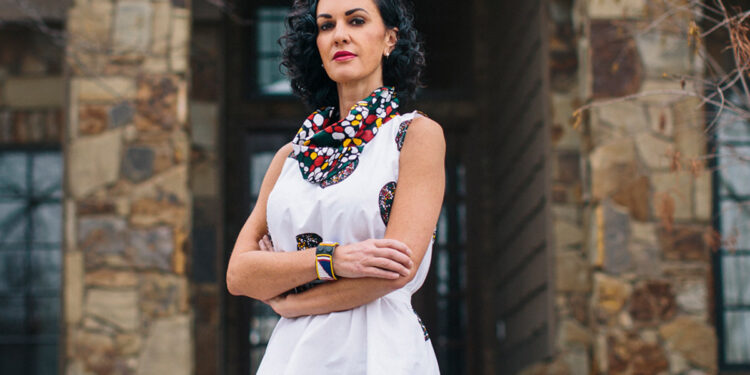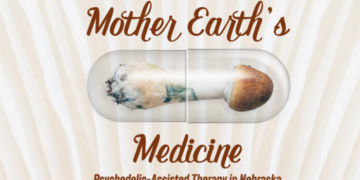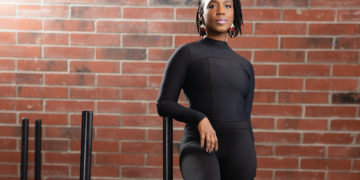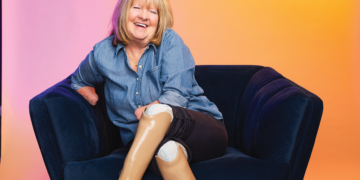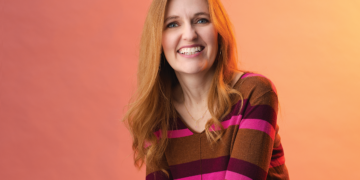This isn’t your average trip to Walmart. Melissa Dahir is on a mission. She’s looking to score hundreds of undergarments and sanitary pads. Yes, hundreds.
Whipping through the parking lot in her drop-top convertible, accessorized in a chic white cowboy hat and equally chic boots, she evokes Shania Twain. Except that she’s also donning light gray medical scrubs.
Man, she feels like a doctor.
That’s exactly what Dahir is. But for now, she’s just another Walmart shopper strutting into the discount store and racking up questionable stares from every teenage cart pusher in sight. That strut continues until she takes her throne—a motorized shopping cart.
Circling an imaginary lasso above her head and scootering through aisles while jamming out to Lil Nas X’s country rap anthem “Old Town Road,” she fills her cart to the very brim…and then some. Her trip comes to a close with a celebratory jig back in the parking lot.
Mission complete.
Most Walmart stops—or most days for that matter—aren’t as twanged out for Dahir. She was filming a video to share across Facebook and garner donations for an upcoming trip to Kenya. That’s where her real mission lives—young women in need.
“This was a fun way to bring attention to taboo topics that are normal for young women, but many don’t want to discuss among all cultures including ours,” Dahir said. “Many girls in Africa don’t go to school during their menstrual cycle due to lack and cost of sanitary products.”
The video worked, leading to $5,735 in donations. The money was used to purchase even more feminine products that help keep girls in school during their cycle.
For too many in sub-Saharan Africa, losing an education is the price for having a period. According to the United Nations Educational, Scientific and Cultural Organization (UNESCO), one in 10 girls misses school while menstruating. In Kenya, specifically, these girls miss an average of 4.9 days of school each month. That’s almost two total months per year.
“Once they start to get behind, some girls can’t return to school altogether,” Dahir said.
Creating this video is just one small, smart, savvy way Dahir is filling a medical gap abroad. As one of the Metro’s leading experts in sexual medicine and vulvar pain, the doctorate prepared nurse practitioner with Omaha OB-GYN Associates is doing the same here at home in vastly different ways.
“I’ve had to work hard to get to where I am, but I’ve been blessed with a good life,” Dahir said.
“Now that I am in my 40s, I really want to do more. I want to understand health care from a global perspective. Why things are the way they are.”
In typical Dahir fashion, the Columbus, Nebraska, native’s journey to becoming a specialized care provider was anything but usual. Originally, she thought her calling was as a more general nurse practitioner when she moved to Omaha in 1997 to study at Clarkson College. She became a board certified family nurse practitioner in 2004 and it was her first job in urology that impacted her path. She remembers women coming to her complaining of painful sex or losing their sexual desire. For these patients, it was about more than just intimacy. It was hurting their day-to-day lives. Marriages were on the line. However, Dahir didn’t know how to help them.
In 2006, Dahir was accepted for an internship at Philadelphia’s Graduate Hospital where she received specialty training from Dr. Susan Kellogg, a leading national expert in this field. When she returned to Omaha later that year, she opened the first clinic devoted to vulvodynia, pelvic pain, and sexual dysfunction. “I was calling the women I saw before saying, ‘Come back! I can help now,’” Dahir said. “It was life-changing for me and my patients. Still, opening this kind of clinic was scary at first because the Midwest is largely conservative. I didn’t know how they would accept it.”
Fast forward a few more years—Dahir wanted to publish research and validate herself in the Midwest medical community so she got to work again. She received her DNP from Creighton University in 2013 where she studied evidence-based medicine and now she is a Co-Principal Investigator for a clinical trial led by Dr. Andrew Goldstein, a well known expert on the East Coast who just happens to be working with the National Cancer Institute (NCI) to develop a protocol that uses cutting edge technology (Atila Biosystems, MobileODT, Wisap) to screen and treat 1.3 billion women who have never been screened for cervical cancer in Peru and Cambodia. Dahir knows her colleague will be part of the master plan.
With both male and female patients coming from across state lines and a schedule that’s booked sometimes three months out, it’s clear they did. Dahir has even been named one of the fellows with the International Society for the Study of Women’s Sexual Health—a top distinction in her field.
For most, that would be enough. Dahir isn’t most, though.
Her path changed—or expanded rather—again when she met Zoe Ryan, a humanitarian who works to gain access to education for youth around the world. The two were at a meeting to discuss eradicating world poverty last spring and instantly connected as the only women in attendance. On a whim, Ryan told Dahir she was leaving for Cambodia in a week and invited her to join. Dahir accepted.
During her six-day visit, she stayed with Dr. Phalla Heng, which helped to open her eyes to the stark reality of medical conditions in one of the poorest nations in the world.
Heng delivers babies, seeing many of the mothers for the first time when they go into labor as prenatal care such as pap smears and screenings are rare. Stillbirth rates are nearly four times that of the United States, cervical cancer is the most common cancer in Cambodian women, and Heng is paid roughly the equivalent of 10 U.S. dollars per delivery.
“A scarf I bought at a market in Cambodia was $10,” Dahir said. “Think about that. Delivering a baby is worth the same amount as a scarf.”
Two months later, in July 2019, Dahir took another trip with Ryan, this time to Kibera, the largest slum in Africa located in Nairobi, Kenya. Life expectancy here is only 30 years, with at least 10% of the population affected by HIV and most residents earning less than a dollar a day.
“Zoe’s the leader. She’s been everywhere. She finds the teams through networking to solve global problems,” Dahir said. “But she needed someone with medical experience too.”
Beyond creating the video to finance the feminine products she smuggled into Kenya (due to pesky custom laws), Dahir had more time to prepare for this trip. She wanted to get a better idea of what to expect before traveling somewhere that looked like no place she’d seen before. Luckily, she only had to look across the office for that person.
Dr. Ray Schulte, Dahir’s coworker at Omaha OB-GYN, has been to Kenya seven times to help with separate medical and social issues. He compares the country to the wild west.
“It takes a little debriefing,” Schulte said. “You’re going to see things you never expected to see.”
He has helped evaluate hospitals, teach interns and residents, and is a board member of Salama Stove. This organization provides free stoves designed to reduce smoke inhalation in Kenyan homes as traditional open-fire-cooking methods expose people to carbon monoxide and burn injuries.
“As doctors, it’s true, we go to improve the health and wellbeing in countries that have limited resources,” Schulte said. “But we also go as individuals to meet our own needs. We live in a country that’s pretty rich, so we feel the need to pass some of that along to others.”
For Dahir, passing some of that richness along came in the form of teaching. Her role in Kenya was to lead sexual and menstrual health classes in grade schools—something new to most Kibera youth.
The biggest challenge Dahir faced was correcting misinformed beliefs rooted in the way of slum life. This is a sprawling neighborhood of an estimated 1 million people, void of most infrastructure. One where women are openly raped in public and choose to sell themselves to afford menstrual hygiene products. A place where police have allegedly been bribed to cover up assault cases against victims as young as 4.
So Dahir knew it was without sarcasm and in full sincerity when one day a young boy asked her if a girl wearing a skirt meant that she was giving consent to be raped.
“Everyone should know sexual health is a human right. It’s nothing to be ashamed of. It’s not dirty. It’s an important part of who you are, and it should always be healthy, not violent,” Dahir said.
Her solution to redefining this culture? Education—even beyond the classroom.
That’s where her next project in Kenya came in. When she wasn’t teaching classes, Dahir spent her time helping rebuild an after-school ballet program called Project Elimu. Here, Kibera children are safe to dance, play, and learn life skills.
In conjunction with Dahir’s work, Mike Wamaya, program director, is creating a dance about menstrual health to raise awareness and break through harmful stigmas. Not only are the dancers gaining new knowledge, but so are audience members—many of whom are adults who have never received sexual health education either—when Project Elimu performs the routine for the community.
“Education is the key to better, especially for women,” Dahir said. “If you educate yourself, you’re more likely to be free from situations of sexual violence. Then, a woman isn’t dependent on a man for a source of income regardless of how he treats her.”
Dahir’s approach to helping Kenya is threefold: teaching sexual health classes, rebuilding Project Elimu, and helping a project that’s in its infancy stages.
Cindy Berkland, a retired nurse practitioner from Omaha OB-GYN Associates, asked for Dahir’s help in a plan that will teach women how to sew reusable menstrual pads. Despite having much smaller wages, a box of disposable pads is the same price in Kenya as the United States.
Berkland’s solution is a pad that can be washed and reused again and again.
“Having your period is an embarrassing topic that girls, parents, and schools avoid,” said Berkland, who previously helped open the first women’s hospital in Naivasha, Kenya. “These girls get very little guidance, so they hide during this time. The issue is then compounded by the families having little money to spend on a pad.”
Beyond providing a cost-effective and eco-friendly solution, the program will teach Kenyan women how to sew—a career skill that leads to independent income. The pads will be donated to schools and sold in packs of six for $5.
“Through all this work, I hope I empower women to take charge of their health, stay in school, and stand up for themselves,” Dahir said. “Then, I hope these women will empower other women to do the same.”
Like Ryan, Berkland is relying on Dahir’s specialized medical knowledge to help spread the word on the budding initiative in an informed yet meaningful manner.
“She has the counseling skills and experience,” Berkland said. “It’s a structured program, factual based and sensitive, but I know she can get the message across really well.”
In February, Dahir walked into a west Omaha bakery. This time she left the cowboy hat at home. It had been more than six months since her two-week trip to Kenya and even longer since Cambodia. Still, pieces of her remain all those thousands of miles away.
Among a bustling lunch crowd, her pride and protective nature for the girls and women she met overseas was palpable. She talked of their conditions. Their challenges. Their courage.
“I’ll try not to get emotional,” she uttered, as if saying it out loud means it will come true. (It doesn’t.)
With her clinic busy as ever, she hasn’t been able to go back yet but tentatively has plans to return to Kenya in later 2020. In the meantime, Cambodia is coming to her.
Heng is moving to live with Dahir and her family in August. Heng will study American prenatal care, so she can bring those practices back to her village and open a women’s clinic with the help of Dahir and Ryan. The goal is to lessen the number of stillborn babies, increase screenings, and offer a little hope and healing for a population that hasn’t seen much for far too long.
“It is a web, really. There are many people in my life who will play a special role in these global endeavors,” Dahir said.
That makes Heng the latest addition to this web—Dahir near the center, helping others like herself turn advocacy into action.
“This isn’t just some small project,” Dahir said. “We’re here to make real change. This is just the beginning.”
It has also reaffirmed a belief that people are more important than anything else in this world.
“My travels to Cambodia and Kenya sent me on a trajectory that truly changed my life because I now place very little value on material possessions,” Dahir said via email. “On the way back from Kenya, I distinctly remember walking through the Frankfurt airport. There were high-end designer stores everywhere and I saw the shoes I had been wanting for the past two years. They were 40% less than in the U.S.—but I immediately walked away. It was that very moment when I realized my life really had changed. Yes, I could have afforded the shoes, but they were not a necessity. I have adjusted my spending habits because I have many other global commitments now. I am paying for Cindy’s (my “adopted” daughter) college in Kenya. Cindy wants to be a mental health therapist so that she can counsel the numerous women who have been victims of abuse. I have achieved many goals which didn’t come easily, but making a global impact in health care was an aspiration I never thought would happen. My dream has come true and it is very infectious in a good way. These global projects make me feel joyful and I cannot wait for the next trip overseas.”
The people of Walmart have been warned.
Visit melissadahir.com for more information.
This article was printed in the May 2020 edition of Omaha Magazine. To receive the magazine, click here to subscribe.



